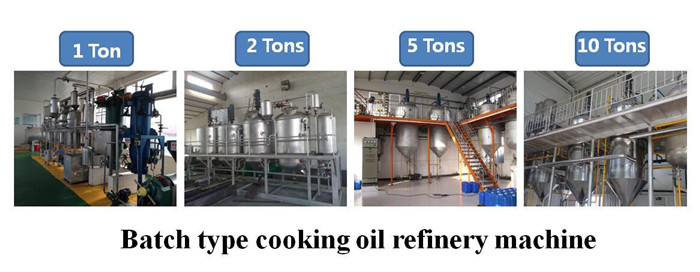Crude oil obtained from expellers or solvent extraction, contains impurities. To make the oil edible, the impurities must be taken out; such a process is called “oil refining(oil refinery plant)”. Oil Refining (Oil Refinery Plant) means conversion from crude oil to direct human consumption, crude oil refinery, edible oil refinery, oil refinery projects and industrial purpose.
In general, oil refinery plant devides to 3 types: batch oil refinery plant, semi-continuous oil refinery plant, continuous oil refinery plant. These 3 oil refinery plants are used for different capacity. But the processes in each oil refinery plant are almost the same.

Crude oil refinery workshop / crude oil refinery plant
1. Degumming:Crude oil obtained by screw pressing and solvent extraction of oilseeds will throw a deposit of so-called gums on storage. The chemical nature of these gums has been difficult to determine. They contain nitrogen and sugar and can start fermenting so they were at first stage thought to consist of glycolipids and proteins.
2. Deacidification/ Neutralisation:
For deacidification/neutralisation, caustic soda is added directly ahead of the second mixer in such an amount that the free fatty acids and the phosphoric acid added previously are completely neutralised. In addition to the stoichiometric caustic amount necessary for /deacidification/neutralisation of the free fatty acids, a certain caustic soda surplus is required, which depends on oil and its quality.
3. Decolorization/Bleaching:
Decoloration/Bleaching process removes contaminants that adversely impact the appearance and performance of these triglyceride (triacylglycerol)-based materials.
Originally described as a process of mixing oil and clay adsorbent to remove color, the decoloration/bleaching operation effectively removes some of the color, reduces the contents of chlorophyll, residual soap and gums, trace metals, oxidation products, and indirectly impacts on deodorized oil color.
4. Deodorization:
Deodorization is actually a stripping process in which a given amount of a stripping agent (usually steam) is passed for a given period of time through hot oil at a low pressure. Hence, it is mainly a physical process in which various volatile components are removed. However, since it is usually carried out at high temperature (> 200°C), some chemical, thermal effects may take place as well.
We can offer whole line of oil refinery plant for different capacity. Different oil seeds need different processes to refine crude oil. Our engineer can help you choose most suitable line for each customer according to material and requirements.
learn more
